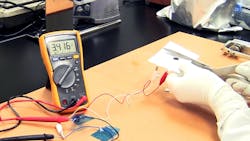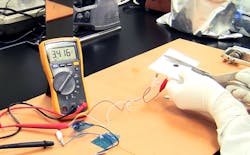The widespread introduction of affordable, energy-efficient electrified vehicles (including electric and hybrid cars) is essential for meeting ambitious government CO2 emissions targets. And, ultimately, it will create a pathway to a transportation system not based on carbon fuels.
The maximum driving range of an electric vehicle is determined by the amount of energy that’s contained in the individual lithium-ion battery cells of the car’s battery pack. These cells are connected in series and parallel arrangements to provide the high currents and high voltage needed to power the electric engine.
While the energy density of the Li-ion battery cell has more than tripled since its market introduction by Sony in 1991, today’s best Li-ions containing a liquid electrolyte have an energy density of little over 700 watt hours per liter (Wh/l), resulting in a maximum driving range of about 500 km.
Introduction of new active cathode materials and the gradual addition of silicon to the graphite anode have provided some energy density increases, but researchers say that the energy density of Li-ion cells is likely to reach a practical limit of around 800 Wh/l. To achieve a driving range of 800 km, cells are required with an energy density of about 1000 Wh/l (or 500 Wh/kg).
Ag-C the Key to New Solid-State Lithium Metal Batteries
On that front, researchers from the Samsung Advanced Institute of Technology (SAIT) and the Samsung R&D Institute Japan (SRJ) reported in the journal Nature Energy (in a paper entitled “High-energy long-cycling all-solid-state lithium metal batteries enabled by silver-carbon composite anodes,” authored by Dongmin Im et. al.) they have created a solid-state battery for electric vehicles that has a 500-mile (800 km) range and can be recharged more than 1,000 times. Their prototype also is approximately 50% smaller by volume than a conventional lithium-ion battery.
It’s been known for some time that an all-solid-state battery with a lithium metal anode would be a strong candidate for surpassing conventional Li-ion battery capabilities. However, undesirable Li dendrite growth and low efficiency had impeded practical application.
Specifically, in the past, the lithium metal anodes used in solid-state batteries have been prone to trigger the growth of dendrites—needle-like crystals that can develop on the anode of a battery during charging. These dendrites often bore through the electrolyte and caused a short circuit during charging with thermal runaway and explosions as a possible result.
The researchers say that by using silver-carbon instead of lithium metal in a prototype pouch will yield a battery with a higher capacity, lengthen cycle life, and make the battery safer. The nanocomposite layer of silver-carbon measures only 5 µm thick. As a result, the team was able to reduce anode thickness and increase energy density up to 900 Wh/l, which would substantively change EVs in the future.
Demo Results
The researchers report that the all-solid-state lithium metal battery with a sulfide electrolyte enabled by an Ag-C composite anode has no excess Li. They showed that the thin Ag-C layer can effectively regulate Li deposition, which leads to a genuinely long electrochemical cyclability.
In their full-cell demonstrations, they employed a high-Ni layered oxide cathode with a high specific capacity (>210 mAh g−1), high areal capacity (>6.8 mAh cm−2) and argyrodite-type crystal (Li6PS5X [X = Cl, Br, I]) sulfide electrolyte. A warm isostatic pressing technique was also introduced to improve the contact between the electrode and the electrolyte. A prototype pouch cell (0.6 Ah) exhibited a high energy density (>900 Wh l−1), stable Coulombic efficiency over 99.8%, and long cycle life (1,000 times).
According to a 2018 United States International Trade Commission document (“The Supply Chain for Electric Vehicle Batteries” by David Coffin and Jeff Horowitz), Samsung is listed as the manufacturer of EV batteries for vehicles such as the 35.8-kWh Volkswagen e-Golf and 22- to 33-kWh BMW i3, both with a range of under 300km.
It’ll still take years to bring this breakthrough to vehicles. The first commercial electric cars equipped with solid-state batteries are expected to get launched in the mid-2020s. Toyota, for one, was expected to present a prototype at this year’s Olympic Games in Tokyo, which have now been postponed until further notice.
Nevertheless, as one of the paper’s authors and the leader of the project Dongmin Im said, “The product of this study could be a seed technology for safer, high-performance batteries of the future. Going forward, we will continue to develop and refine all-solid-state battery materials and manufacturing technologies to help take EV battery innovation to the next level.”
SAIT is also studying Li-air battery technology, which has the potential to provide a range of more than 800 km on a single charge. This research focuses on cathode technology, protective films for lithium metal anodes, and electrolytes for energy-density improvement, long-term reliability, and safety. SAIT further is performing research on sodium rechargeable batteries with low cost and high energy density.

